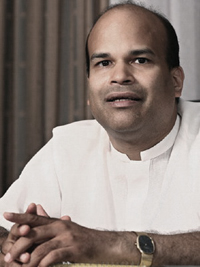The Leader of the Sri Lanka National Congress, Minister Milinda Moragoda, has highlighted the importance of getting more women involved in the political process. To do this it policies conducive to facilitating their entry into politics must be put in place.
In Sri Lanka, women are vastly underrepresented in government, with women representatives comprising only 1.8% of the representatives at the local government level, 5.0% in the provincial councils and 5.8 % in parliament. This is the one of the lowest ratios of any country in the region.
With the high levels of education that Sri Lanka has attained, and the fact that there are more women university graduates than men, and many women in leadership roles in other sectors, it is a paradox that the number of women entering politics remains so abysmally low. It is a further paradox since Sri Lanka was the first country in the world to have a woman prime minister.
Governments of most countries have become sensitized to the specific problems and inequities faced by women as a group and have instituted government policies that seek to redress the many issues they are confronted by. In 1975, the UN declared the International Women’s Year, and following this, in 1976, the UN Decade for Women.
It is time that the contribution of women to the social upliftment and economic development of our country is recognized and acknowledged, and that the many issues that face women are addressed, he added. Women carry more than their brunt of the work-load and as a group have made many enormous contributions and sacrifices for the nation as both workers and professionals.
It is a well known fact that women are responsible for a large portion of foreign exchange earnings, and support vital sectors of the Sri Lankan economy, whether as house maids in the Middle East working in inhospitable conditions - and separated from their loved-ones – or as workers in the garment and tea industries. In addition, women are at the forefront of many industries and play leadership roles in society.
Minister Moragoda also further observed that female political leaders by providing an alternative outlook, could help bring a positive change to the political culture and would help to reorient political debate.
Minister Moragoda stated that as a first step towards correcting this serious gender imbalance, he will advocate to the government that it brings in the necessary legislative framework to allocate 25% of the seats at every level to women over a predetermined period of time.
The Minister drew attention to the Women’s Manifesto, issued by representatives from 12 different women’s associations which sets out the major issues that they feel need to be addressed by government.
Minister Moragoda has always been a supporter of women’s equality. In 2002, as the Minister of Economic Reform and Science and Technology, he paved the way for greater participation of women in the institutions coming under his ministry. During his tenure there, he had kept his pledge to fill 1/3 of all key posts in the institutions under his ministry with women.
Minister Moragoda as Leader of the Sri Lanka National Congress stated that as suggested in the 2007 Women’s Manifesto, he will advocate for the appointment of a special Ombudswoman to look into women’s issues and grievances, and that this initiative will be included in the policy framework of the party and would be proposed to the government for implementation.
Minister Moragoda has also been advocating the need to provide Sri Lankans living abroad with the opportunity to vote at elections, a large number of which are women. |

